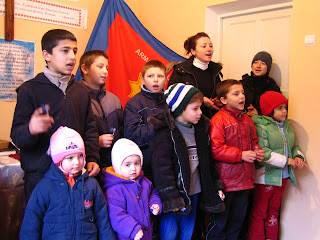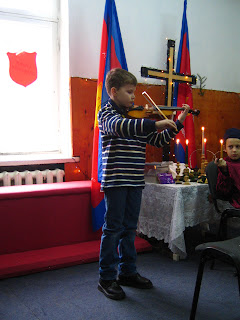We finished off last time mentioning the visit of some people from IHQ to check out our 'Sally Ann' work project. They have been and gone, and together we explored some ideas for helping this fledgling ‘business’ grow. During the few days they were with us, we travelled to Ungheni, a town in the north west of Moldova where the project began in this country. It was good to meet with the ladies who sew the items which are shipped to Norway and Sweden in response to orders received. It was moving to hear their stories of how this work helps them to improve their meagre lifestyle. Similar stories would be told in every village in Moldova as the government provides nothing to help people in these situations. It’s good to be able to say The Salvation Army is making an effort to provide work opportunities like this, and we want this to expand. This is more than band aid treatment for the problems that exist…it is tackling the root issues that cause so much hardship. Unemployment rates in the rural areas are around 80%, but this is a start. The pictures below show the ladies making beautiful linen tablecloths and place mats.
Sunday 20th January we travelled about 20 kms out of Chisinau to a small town called Ialoveni. Here there was a warm congregation to greet us, and special guests from the local government were also there for the service. They spoke appreciatively of the work of the Corps leader and members in the community. Every day, a meal is provided for some of the poorest people in the town, and humanitarian aid is distributed to agencies and individuals by The Salvation Army as it becomes available from neighbouring countries. Even though many of our Corps are ‘smallish’ (35-70 people) they still have a significant impact on their communities.
On Saturday 26th January (Australians all let us rejoice..etc) we set off with the Mobile Medical Team to visit a country village, Dezghingea, to see them in operation (no pun intended!)
We arrived at what used to be the local hospital, and already about 200 people had gathered there in wait for some attention. There are no medical services at all in this village, and the nearest town with any services is about 10 kms away. A long way when you have no transport – and no money, especially for the elderly.
The hall where the clinic was held
Locals coming to the clinic. Many of these horse drawn carts share the bad roads with fast moving trucks and cars.
The day started with a greeting by the local district health official, who expressed his appreciation for the ministry of the doctors. Dr. Caraman, a Salvationist who heads the team responded, and in his response, pointed out that the greatest healing comes when we encounter God. A singing group of five from the nearest Corps sang a couple of songs and a brief spiritual message was given.
This old lady had just received a free hearing aid
Ian was doing OK until we entered the dentist’s room. Because of the state of people’s teeth, and the lack of ability to do fillings etc, all he does is pull teeth. A quick jab with anaesthetic, wait two minutes (if they are lucky) and then yank!!! A ‘two point shot’ is then performed with the offending article being thrown into the adjacent rubbish bin! At this point, Ian had to sit down, (although he was careful not to sit too close to the dentist in case he was mistaken for the next patient.)

Nostalgiac picture in one of the clinic rooms from Soviet times - Lenin keeping watch!
Just before we left the clinic, we wandered across to the adjacent Orthodox Church for a look. The priest, Father Dimitri, was delighted that we wanted to come in, went and got the keys, robed up for us and spoke about the 200 year old church and his ministry. We have heard stories of the Orthodox Church’s opposition to the protestant church, including the Army included, but as we talked together for about 30 minutes, it was good to share about the things that unite us rather than divide us. It was a special time.
The beautiful, very ornate Orthodox Church
The roof of the Church
The next day, we visited Criuleni, a small village about 35 kms from home, and were privileged to meet with the members of this Corps in worship. Their building is a house which has had two rooms made into one for their meeting area, about 3m by 10m. There were 30 people in attendance. The building has no heating, and it was very, very, very cold. At the end of the service, hot tea and biscuits were served. Many of the people in this country meet in cold conditions, although the Territory is endeavouring to address this problem. Requests often come to DHQ asking for extra finance because they can’t afford their heating bills.
 Criuleni Salvation Army Hall. Like many builidngs of this vintage,
Criuleni Salvation Army Hall. Like many builidngs of this vintage,the roof is made of asbestos!


Children participating in worship

Strong, sweet, hot black tea and biccies!!
Most welcome in this cold hall.
Today we visited a Corps in the far north (Edinets) which has a small meeting room and weekday administration facilities in a basement provided free of charge by the local government. As we sat and shared with the officers, two buckets caught the drops of water coming from the ceiling. It felt and smelt damp, and the small blower heater in the corner did little to warm us up. We had been given some money from friends in Australia to use at our discretion, so we had great pleasure in telling them to go and buy a decent electric heater, and sent us the bill.


We conclude with a few photos from our installation meeting which was held on 13th January.

Traditional Moldovan welcome: partaking of bread, salt and juice.
 Some of the congregation
Some of the congregation
Commissioners Wim and Netty van der Harst conducting the Installation



That’s it for now. Until next time…..
Ian and Viv xox















































